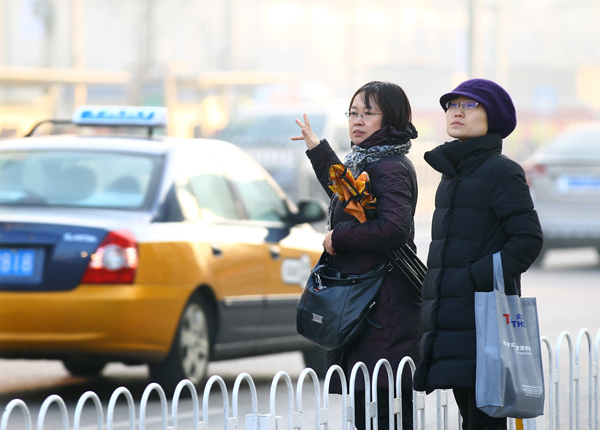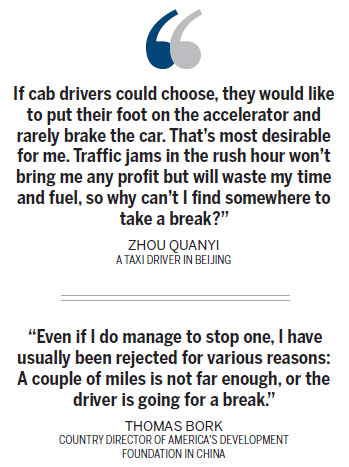Taxi shortage means passengers are fare game
Updated: 2013-01-17 08:10
By Hu Yongqi and Zhang Yuchen (China Daily)
|
||||||||
It is becoming harder to hail a cab during busy periods in the capital, as Hu Yongqi and Zhang Yuchen report from Beijing.
For many potential rush-hour passengers on Beijing's streets it has become an all-too-familiar sight.
A taxi slows down, pulls alongside, but then speeds up before disappearing into traffic, leaving the would-be fare disgruntled and frustrated by the roadside.
 |
|
Attempting to hail a taxi in Beijing, especially during rush hour, can be an exercise in frustration. Zou Hong / China Daily |
And the jury is still out on how to resolve the problem, with experts calling for an end to heavy traffic congestion and a change in the way people travel, while taxi drivers bemoan "crippling" monthly franchise fees and rising fuel costs.
Foreigners frequently feel they are being singled out for such treatment.
Thomas Bork, country director of America's Development Foundation in China, has been traveling back and forth to the country since the early 1990s.
His memory of Beijing's taxis dates to 1996, the second time he arrived in the capital. Yellow vans operating as taxis were running throughout the city but taxi drivers, like many today, did not speak English. There was far less congestion and it was much easier to hail a cab than nowadays.
 |
"During the past three weeks in the area I live - Weigongcun in Haidian district - the number of taxis passing by has been zero," said Bork. "Even if I do manage to stop one, I have usually been rejected for various reasons: A couple of miles is not far enough, or the driver is going for a break."
Once Bork argued with a cabbie after the driver told him to get out. Unable to reach an agreement, he recorded the number of the car and called the taxi company, with the driver liable to a three-day suspension for breaching regulations.
"But I don't complain about the drivers when it comes to severely congested roads in bad weather or in rush hours," he said. "A few times, the driver has even suggested I take the subway even though I was in his car."
Bork said one last resort was to take an illegal taxi charging fares that were twice the going rate.
A PE teacher at an international school in Beijing, who gave his name only as David, said arguing with a taxi driver only made him angrier. The US citizen, who has been in the city for two years, said he had been rejected by a cabbie nearly every day, sometimes merely for standing on the wrong side of the road.
From Dec 28, taxi drivers who fail to pick up passengers face suspension from work for one to three years, being blacklisted and never working in the industry again, according to the Beijing Municipal Transportation Administration Bureau.
Although 66,000 taxis ply the capital's roads, many people like Bork still find they are unable to hire a cab during rush hours or in extreme weather conditions such as torrential rain or on snowy days. The number of cabs in Beijing has not changed for more than a decade and the current fleet is unable to meet the demands of an increasing population.
It is estimated that about 10,000 taxis suspend their service during rush hours, making it more difficult to find a cab, according to a report by People's Daily. Experts suggest that competition should be introduced to the industry to provide better service.
 |
 |

 Li Na on Time cover, makes influential 100 list
Li Na on Time cover, makes influential 100 list
 FBI releases photos of 2 Boston bombings suspects
FBI releases photos of 2 Boston bombings suspects
 World's wackiest hairstyles
World's wackiest hairstyles
 Sandstorms strike Northwest China
Sandstorms strike Northwest China
 Never-seen photos of Madonna on display
Never-seen photos of Madonna on display
 H7N9 outbreak linked to waterfowl migration
H7N9 outbreak linked to waterfowl migration
 Dozens feared dead in Texas plant blast
Dozens feared dead in Texas plant blast
 Venezuelan court rules out manual votes counting
Venezuelan court rules out manual votes counting
Most Viewed
Editor's Picks

|

|

|

|

|

|
Today's Top News
Boston bombing suspect reported cornered on boat
7.0-magnitude quake hits Sichuan
Cross-talk artist helps to spread the word
'Green' awareness levels drop in Beijing
Palace Museum spruces up
First couple on Time's list of most influential
H7N9 flu transmission studied
Trading channels 'need to broaden'
US Weekly

|

|








